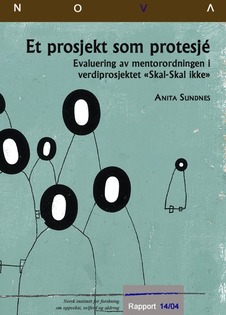Et prosjekt som protesjé
Abstract
Summary This report presents results from NOVAs evaluation of the mentor function in the "Should-shouldnt" study. This is a three-year, value-based project aiming to increase the competence of schools and kindergartens in working with the development of positive attitudes and values among children and youth. The project started in August, 2002, under the auspices of Kristent Pedagogisk Forbund. "Should-shouldnt" tries to facilitate participants development and enactment of their own local projects, mainly through giving each local project access to an external professional person during the three years of the study period. This professional person, the mentor, is to be supportive and helpful, but the participants themselves are responsible for choice of theme and methods in the local projects. Halfway through the project period "Læringssenteret" initiated an evaluation of the mentor function, based on interviews and observation at three of the participating schools. The main evaluation issue concerned conditions for a well-functioning mentor arrangement. The aim has been to describe how the three schools have experienced the contributions of the mentors to the progress of the projects, and to discuss possibilities for further development of the mentor function. The three schools had many common experiences, even though the focus of their local projects differed. They acknowledged that innovative work with values presupposes consciousness-raising work within the teaching staff as well as directed towards the pupils. They all want to use the three year period as a means to establishing work with values as a lasting practice. However, the collaboration between the mentors and the schools was organised in different ways, sometimes very different. The mentors degree of interaction with the different parties participating in the local projects (i.e. principal, teachers, parents, and pupils) varied, but in the main contact was most regular and close with the project leader and the teaching staff. The main conclusion is that the mentor function contributes to the progress of the local value projects at several levels. During hectic school days it is difficult to find the necessary time and resources for this kind of work. That the mentor obliges the school to keep up the activities is, thus, important. In addition, the positive interest and acceptance showed by the mentor increases motivation, and questions asked by the mentor give the participants an opportunity for reflection concerning their own priorities in the projects. Further, it is an advantage if the mentor shows herself or himself to have relevant, theoretical competence exceeding that of the teachers. Teaching staff profit by listening to and discussing with someone who is not only from outside their own school, but who can also contribute with more general "outsiders views". The collaboration was, however, also characterised by a certain insecurity concerning how the mentor should be used. Within the time frames given it might also become problematic for the school as well as the mentor to keep continuity in the contact. As a consequence of this, collaboration might become less systematic. Experiences show that the mentor function will profit by a better concretization of what the mentor is supposed to do in the local projects. The evaluation has resulted in descriptions of how local projects can vary in the ways they are organized, and how mentors may be used in different ways. Further, it shows that that mentors as supervisors fill different roles in relation to project leaders, teaching staff and the school as a whole. A way forward for this and/or future mentor functions probably is to clarify what kind of help the different local projects need, as well as the particular strengths of the individual mentors. A more limited focus, directed at particularly pertinent parts of the value projects, may beone way of capitalizing on the time resources as well as the professional resources of the mentors. Hvilken betydning har det for en skole å få tilgang til en ekstern mentor i sitt verdi- og holdningsarbeid? "Skal-Skal ikke" er et statlig finansiert verdiprosjekt der 26 skoler, barnehager, menigheter og lokalsamfunn deltar med egne opplegg knyttet til bevisstgjøring av verdier. Hver deltager får tilgang til en ekstern fagperson som skal følge og støtte dem gjennom treårsperioden prosjektet varer. På oppdrag fra Utdanningsdirektoratet har NOVA gjennomført en underveisevaluering av mentorordningen, på grunnlag av feltarbeid i tre av skolene. Denne rapporten formidler erfaringer med mentorenes bidrag, og gir anbefalinger om videre utvikling av ordningen. Last ned rapporten i fulltekstformat (pdf)
